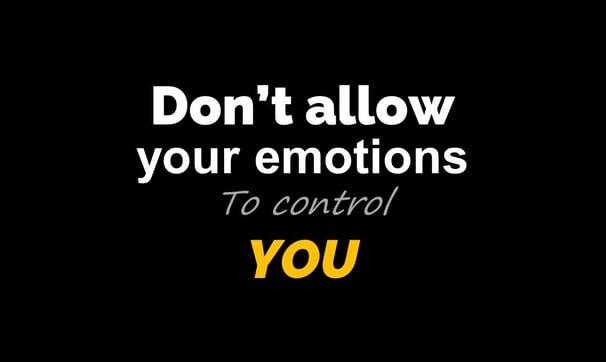Don't allow your Emotions to Control You
INSPIRATIONFEATURED


"When emotions dominate reason, individuals may find themselves making impulsive decisions or reacting in ways that can be detrimental to their well-being"
Emotions are a fundamental aspect of the human experience, shaping our perceptions, decisions, and interactions. While they add depth to our lives, allowing us to experience joy, love, and empathy, it's crucial not to let emotions take control. When emotions dominate reason, individuals may find themselves making impulsive decisions or reacting in ways that can be detrimental to their well-being.
Self-awareness is the first step in gaining control over your emotions. Understanding the triggers and patterns of your emotional responses empowers you to navigate challenging situations with greater clarity. By recognizing the emotional currents within yourself, you can begin to develop strategies to manage and channel them constructively.
Reacting impulsively to intense emotions often leads to regrettable outcomes. Whether it's responding in anger, succumbing to anxiety, or being overwhelmed by sadness, impulsive reactions can strain relationships and hinder personal growth. Taking a moment to pause and reflect before responding allows for a more measured and thoughtful approach.
Emotional intelligence, the ability to recognize, understand, and manage one's own emotions as well as those of others, plays a pivotal role in not letting emotions control you. Cultivating emotional intelligence involves honing skills such as empathy, self-regulation, and effective communication, which collectively contribute to a more balanced emotional state.
Mindfulness practices, such as meditation and deep breathing exercises, provide tools to bring awareness to the present moment and detach from overwhelming emotions. These techniques enable individuals to observe their feelings without being consumed by them, fostering a sense of control and resilience.
Setting boundaries is crucial in preventing emotions from dictating your actions. Clearly defined boundaries help protect your well-being by establishing limits on what you will tolerate in various aspects of your life, from personal relationships to work environments. Recognizing and enforcing these boundaries is an essential step in maintaining emotional balance.
Developing a support system of friends, family, or mental health professionals can provide invaluable assistance in managing emotions. Sharing your feelings with trusted individuals can offer different perspectives, guidance, and a sense of connection, reinforcing that you are not alone in your struggles.
Healthy lifestyle choices, including regular exercise, proper nutrition, and sufficient sleep, contribute significantly to emotional well-being. Physical well-being and emotional health are closely interconnected, and maintaining a balanced lifestyle can provide a foundation for emotional resilience.
Learning from experiences is a powerful way to prevent emotions from controlling your future actions. Reflecting on past situations where emotions may have led to less-than-optimal outcomes allows for personal growth and the development of coping strategies for similar situations in the future.
In conclusion, while emotions are an integral part of being human, it is essential not to let them take the reins of your life. Through self-awareness, emotional intelligence, mindfulness, setting boundaries, seeking support, and making healthy lifestyle choices, individuals can navigate their emotional landscape with greater control and lead more fulfilling lives. Remember, you are the captain of your ship, and by mastering your emotions, you can steer it towards calmer and more prosperous waters.
Credit: Linkedin
